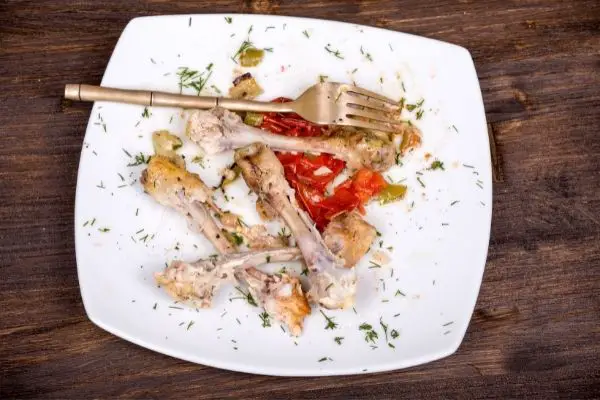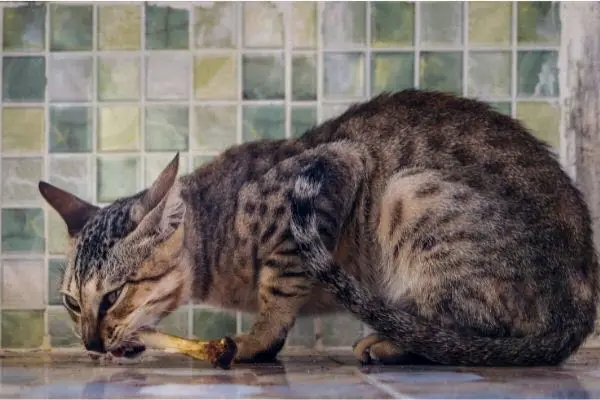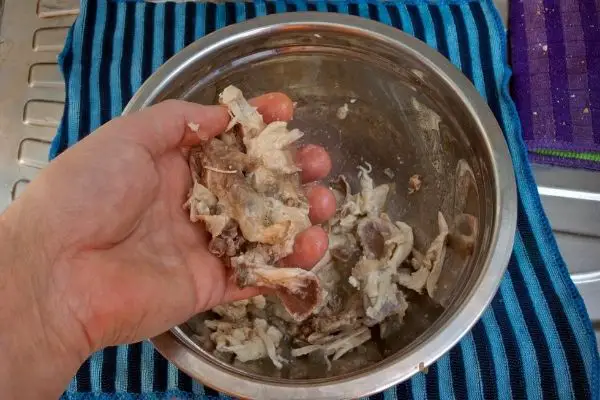Clever Compost Ideas: Can I Compost Chicken Bones?
Composting is one of my favorite topics! I feel that diverting food scraps from landfills is a small but very achievable ‘green step’ for my family.
If you’re new to composting, it’s easy to get carried away feeding your compost pile a whole host of kitchen scraps. But did you know that all food waste can be composted the same way (or, sometimes, at all)?
Some of the most infamous “forbidden” foods include meat and dairy. These items can throw off the ecosystem within your compost pile and even spread disease.

So, you should NOT compost meat, unless you can process it first (with Bokashi, for example) to make it safe. What about the leftover bones?
You can compost chicken bones under the right conditions. You’ll be much better off placing bones in a Bokashi bin or hot compost than with your traditional cold compost.
What You Need To Know About Composting Meat
Many amateur composters believe that all kitchen scraps are safe to compost. Like for any other organic matter, decomposition of meat and bones will eventually occur, however it is what may happen before the breakdown that is worth considering.
Much of your household food waste will break down perfectly fine in a compost heap. When it comes to meat, however, the risks of composting often far outweigh the benefits.
What are the main risks?
It Attracts Pests
Meat is a high-value food source for animals – both for wild ones as well as nearby pets. Placing meat in your compost pile is an open invitation to neighborhood critters to pay your yard a visit and make a mess.
It is so attractive to wild animals that some municipalities actually ban composting meat in the first place.

It Can Spread Pathogens
Cooking with meat requires far more care than any other ingredient. Not only do you need to be extra-conscious of expiration dates and cross-contamination but you also need to thoroughly clean every work surface after you’re done.
Failure to take these precautions could spread pathogens throughout your home.
Well, those same pathogens can take up residence in your compost bin. For example, E. coli, a common bacteria found in meat, can survive for two years in compost.
If you use contaminated compost in your garden, you’ll spread those pathogens to your vegetable crops. You could also potentially infect local wildlife who visit your garden beds.
It Can Lead To Smelly Compost
We all know the smell of rotting meat. There’s a good chance that’s what your compost pile will smell like after a few days.
Hot composting can prevent the growth of odor-causing bacteria from meat and other waste. But the average compost heap won’t reach temperatures high enough to kill off the foul smell.
Are Bones Compostable?
So, meat probably shouldn’t go into your compost pile. But what about the leftover bones?
If your family enjoys grilled chicken thighs or crispy fried drumsticks, then chicken bones are likely a staple in your kitchen trash can.
Like meat, bones can technically be composted. That doesn’t always mean they should be.
While the bones themselves are generally harmless, any meat remaining on the bones can cause issues. So if you do plan to incorporate chicken bones in your compost pile, here are a few things you should know:
How to Compost Bones Safely and Effectively
Pre-Process with Heat
Cooked bones — like meat — are less likely to carry harmful bacteria. Also, the heat can help jumpstart decomposition before the chicken bones even make it to your compost heap.
Break Them into Small Pieces
It’s common knowledge that smaller pieces of food waste will break down faster in compost. The same is true of chicken bones!

Since poultry bones are already quite small, thin, and lightweight (especially compared to pork, cattle, or wild game like deer) they break down much faster than other bones. But crushing or cutting up chicken bones will help the composting process along greatly.
Use a Bokashi Bin or Hot Compost
Adding bones to green compost is typically not recommended.
While you may be successful adding chicken bones to a traditional compost pile, you’ll have much better results using a Bokashi bin – which is my favorite fast-tracking composting method.
However, size still matters. Large bones will take much longer to ferment (Bokashi uses fermentation to break food down) while other food scraps inside the Bokashi bin will break down much faster. Crushing or cutting into smaller pieces will help.
Frequently Asked Questions
How long do chicken bones take to compost?
Whether composted or left to decompose “naturally,” it takes several months for poultry bones to decompose. The smaller the bones (or the more broken up they are), the less time it will take on average for them to fully break down.
Can you compost chicken eggs?
You probably know that composting eggshells is a-okay.
What about whole eggs, though?
The risks associated with composting whole eggs — especially raw — are similar to those that come along with composting meat.
Salmonella, a common pathogen in eggs, can spread to your compost pile. Plus, the inside of a chicken or duck egg is like liquid gold to many wild animals. And we don’t even need to mention the rotten egg smell… do we?






